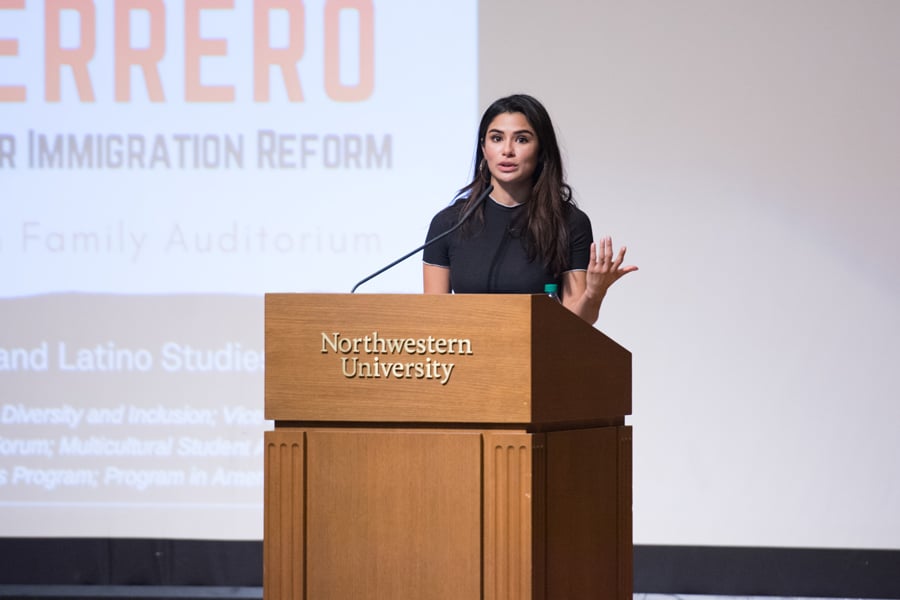‘Orange is the New Black’ actress shares her experience with immigration policy, mental health
(Jack Lido/The Daily Northwestern)
Diane Guerrero addresses Northwestern students in a Tuesday speech. The actress, known for “Orange is the New Black” and “Jane the Virgin,” spoke on her experiences in the entertainment industry and her struggles with mental health.
October 4, 2017
“Orange is the New Black” actress Diane Guerrero began her speech Tuesday night by calling attention to those affected by natural disasters in Latin America, the Caribbean and the southern United States as well as the “unnatural disaster” in Las Vegas.
“Many members of our community are busy trying to survive before they can celebrate (Latinx Heritage Month),” Guerrero said.
More than 500 people gathered in Ryan Family Auditorium for the speech and Q&A session hosted by Multicultural Student Affairs and the Latina and Latino Studies Program. The event, part of Latinx Heritage Month, addressed Guerrero’s book, “In the Country We Love: My Family Divided,” and her activism on immigration policy.
Guerrero, who is also in “Jane the Virgin,” said she recognized she was standing on stolen Native American land and issued a “genuine apology for the harm inflicted.”
She also shared her theory of family, love and resistance, which she said helped her survive the struggles she experienced since she was a child. At 14, Guerrero, the only documented citizen in her family, arrived home to find that her family had been deported to Colombia, she said.
“The country just decided it was more important to remove someone that I love than for me to have my family,” she said. “It was like I lost my voice, and I’ve been working ever since to get it back.”
As someone who has experienced depression and anxiety, Guerrero said entering an industry where she would be openly judged was “jolting.” Loving and being honest with herself, she said, helped her make progress in acting.
Weinberg sophomore Salma Saavedra said she attended the event after reading Guerrero’s book and seeing her on television.
“Coming from a Latina to another Latina, it was really inspiring,” Saavedra said. “Especially since you don’t see a lot of Latinos in those roles, just seeing somebody ‘made it’ and is still making strides in that industry is really cool.”
Guerrero also emphasized the importance of normalizing discussions about mental health and supporting marginalized people by sharing their stories.
After playing stereotypical, “two-dimensional” roles, Guerrero said she decided to tell more thoughtful stories and use her platform to speak for the “forgotten and the marginalized.”
After President Donald Trump decided to terminate the Deferred Action for Childhood Arrivals program, Guerrero said the actions taken by those who are DACA recipients inspired her to share her story. She thanked students who are DACA recipients for being brave, encouraged them to stay strong and said what they feel is valid.
Spanish and Portuguese Prof. Frances Aparicio, director of the Latina and Latino Studies Program, said the program invited Guerrero because she “exemplifies the consequences and the impact that deportation has on families but also on human beings.”
Aparicio added that she hoped undocumented students would relate to Guerrero’s experience and take time to reflect.
“We’re trying to put a human face to these issues,” she said. “Immigration policy is not just about numbers and legal issues; (it) is also about human rights.”
Email: [email protected]
Twitter: @_perezalan_


